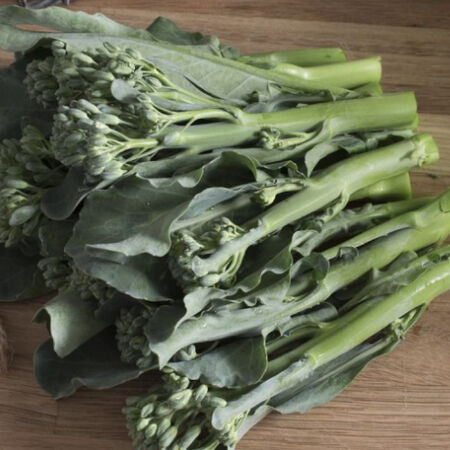Happy Rich Baby, (F1) Broccoli Seeds
Out of Stock
Key Attributes
Key Attributes
Product Details
Plant Height
18-30"Botanical Name
Brassica oleraceaSeed Type
SeedSeeds Per Gram
194Seeds Per Pound
88,000Row Spacing
3'Packet
100 SeedsSow Depth
1/4"Seeds Per Ounce
5,500Fruit Color
GreenBreed
F1 HybridSun
Full Sun / Partial ShadeMaturity
Early SeasonCubic Inches
1.4625Life Cycle
AnnualSow Method
TransplantPlant Spacing
18"Categories
BroccoliGermination
5,6,7,8,9,10Days To Maturity (# Days)
55Seeds Per Acre
1.25 lbsComponents
Growing Instructions
![]() Learning Download: How to Grow Broccoli
Learning Download: How to Grow Broccoli
Broccoli is a hardy, cool-season vegetable bringing colorful green nutrients to the table. Broccoli is part of the Cole Crop family, which also includes cabbage, kohlrabi, kale and more. It can be grown twice a year, in the late spring and the fall.
Before Planting: Broccoli prefers a well-drained, fertile soil high in organic matter, and a pH of 6.0–7.5 with a consistent supply of moisture throughout the growing season. Irrigate regularly for best results. Broccoli does not generally do well in hot weather. The best success is with spring and fall crops.
Planting: Use early and midseason broccoli varieties in the Spring. Sow 2 seeds per cell or 3–4 seeds/in. in row flats. Seedlings should be ready to transplant in 3–4 weeks. If possible keep soil temperature at 80°F until germination, then reduce air temperature to about 60°F. Ensure good air circulation and light. Transplant outdoors 10–18″ apart in rows 18–36″ apart. Broccoli prefers cooler growing temperatures, between 55–75°F but will produce good crops under warmer, summer conditions. For a Fall crop, start seedlings indoors 3-4 weeks before transplanting. as above in May and transplant to the garden in June–July. To ensure mature heads, seed the crop early in areas where heavy freezes occur early in the Fall. Successful broccoli crops can be grown where winters are rarely below 32°F. Transplants can be set out from September to February in these regions. Sow 3–4 seeds 12″ apart, ½” deep, rows 18–36″ apart, thinning to one plant in each group.
Watering: Broccoli likes cool soil, so adding grass clippings around the plants helps. Also, water deeply and often. When watering broccoli, do not get water on the developing heads. Some varieties of broccoli are heat tolerant, but still require adequate watering, such as 1 to 1.5 inches of water per week.
Days to Maturity: Broccoli is ready to harvest when florets are tightly closed in the center but begin to loosen slightly around the edges. (50-80 days)
Harvesting: Before flower buds open, cut center head. Harvest secondary side shoots regularly to encourage continued production. If buds begin to show a yellow color, harvest immediately.
Tips: Repel flea beetles and root maggots on young seedlings by covering with floating row covers from day of planting. Treat flea beetles with pyrethrin or azadirachtin if heavy pressure is observed. For cabbage worms and loopers, use Bacillus thuringiensis (Bt.).
AVG. Seeding Rate: 1,000 seeds/83′, 50,000 seeds/acre spaced 7″ apart in rows 18″ apart.
Shipping Schedule
Our Seed Promise
 "Agriculture and seeds" provide the basis upon which our lives depend. We must protect this foundation as a safe and genetically stable source for future generations. For the benefit of all farmers, gardeners and consumers who want an alternative, we pledge that we do not knowingly buy or sell genetically engineered seeds or plants.
"Agriculture and seeds" provide the basis upon which our lives depend. We must protect this foundation as a safe and genetically stable source for future generations. For the benefit of all farmers, gardeners and consumers who want an alternative, we pledge that we do not knowingly buy or sell genetically engineered seeds or plants.
The mechanical transfer of genetic material outside of natural reproductive methods and between genera, families or kingdoms, poses great biological risks as well as economic, political, and cultural threats. We feel that genetically engineered varieties have been insufficiently tested prior to public release. More research and testing is necessary to further assess the potential risks of genetically engineered seeds. Further, we wish to support agricultural progress that leads to healthier soils, to genetically diverse agricultural ecosystems, and ultimately to healthy people and communities.
To learn more about the "Safe Seed Pledge" please visit www.councilforresponsiblegenetics.org.

